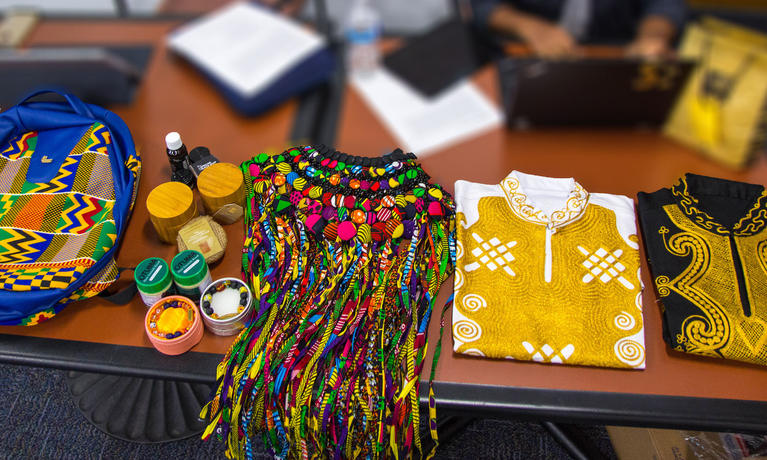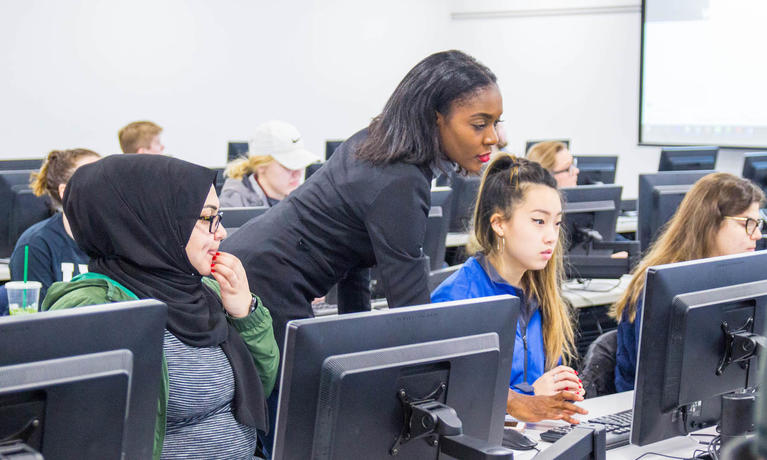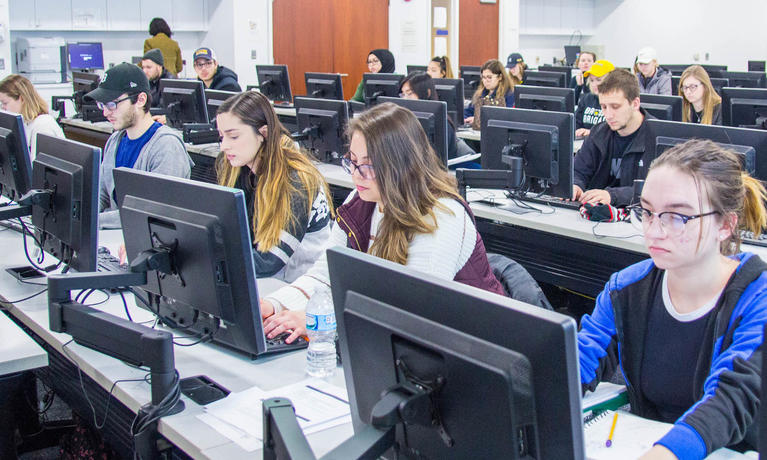
With the soft leather material, vibrant print and interesting pattern work, the backpacks student Kristina Lee evaluated for market viability in her College of Business course weren’t like anything the senior had seen before. But the items’ intrigue went beyond fashionably unusual; they also played a part in a unique educational opportunity.
Lee’s MKT 454: Market Research class took part in an international initiative called the Digital Futures Fellowship Program where students — guided by their professor, mentors and experienced multicultural business owners — work directly with African entrepreneurs to help the small-to-mid-sized retailers evaluate their “going global” potential.
The program — created by the Detroit-based Virtual Global Consultant (VGC) Group — piloted in the class led by Marketing Associate Professor Crystal Scott earlier this year. The VGC Group, a digital business consulting and e-commence design and development service, is a frequent partner of the College of Business and was recognized as the COB 2018 Employer of the Year for providing internship and employment opportunities for students.
“The Digital Futures program gave me the chance to meet people from the other side of the world to help me better understand how they do entrepreneurship and see how my knowledge could help them break into the U.S. market,” says Lee, who was in a class group partnered with a clothing and accessory designer named Aaron Scissorhands; the eight other business enterprises the class worked with created items like organic African skincare and hair products and African-dyed fabrics.

The VGC Group co-founders Naomi Jordan Cook and W.E. Da’Cruz provided both in-person and virtual mentoring and support to the COB students for the duration of the three-month program. The women also shared cultural information and made virtual introductions for the student groups to the nine Ghanaian entrepreneurs.
“In Ghana, the traditional way to do business is in your store-front at your home or at the market with neighbors and the people you know. We do not want to replace their cultural tradition, but we do want to help get viable authentic African products out to a wider audience,” says Da’Cruz, who lived in Ghana as a child. “Our vision is to help people, organizations and businesses go global. We believe eCommerce is a vehicle that drives economic development. Our job at VGC is to build the vehicle and put as many people in the driver’s seat.”

Scott said working with the West African businesses and helping plan for e-commerce expansion allowed students to apply what they’ve been learning in their COB classes and expand their skill set.
She says the students learned about the logistics issues many businesses in Africa face — for example infrastructure concerns include intermittent electricity and limited road infrastructure in some areas — from the people who are experiencing this.
“They also saw the resilience and work ethic many have in spite of it,” says Scott, COB assistant dean. “We can teach the quantitative part of research in class, but the Digital Futures Fellowship Program gave our students experience in qualitative research too. They did interviews and created a plan by working with an actual client, a client from West Africa.”
And it’s an experience that’s needed: In a program pre-assessment, nearly 75-percent of the 30 students said they want to pursue international business after graduation, but a majority of the class had never engaged with anyone from Africa or even engaged with authentic African-made products.
“Our students need to know about all of the entrepreneurship happening in Africa — there are at least 400 different African companies with revenues of more than $1 billion (U.S. dollars),” Scott says. “And the profitability and growth are in all different sectors, not just tech. Africa is where to look if you are interested in international business; the opportunities you can get involved with run the gamut.”

After a semester of research, the students presented their findings and submitted their research reports to the VGC Group in a two-day reporting session. The research findings included recommendations a market viability report and how the companies can expand and increase their sales globally. Lee’s group said that Aaron Scissorhands has products would have global interest, but suggests he invest in a stronger online presence before expanding; for example, build up his social media presence and customer interaction before engaging with a U.S. audience.
Da’Cruz and Cook recently traveled to West Africa to go over next steps individually with the entrepreneurs and with program logistics partner DHL Ghana. “It was important for us to engage with the African companies in person to build trust and to show our commitment about building their brands globally,” explains Cook. Scott also is planning a trip to West Africa in the near future.
The three business women say the venture is showing signs of success — all nine enterprises are in the process of having a well-designed online presence — and the partnership will continue through the campus course next academic year.




